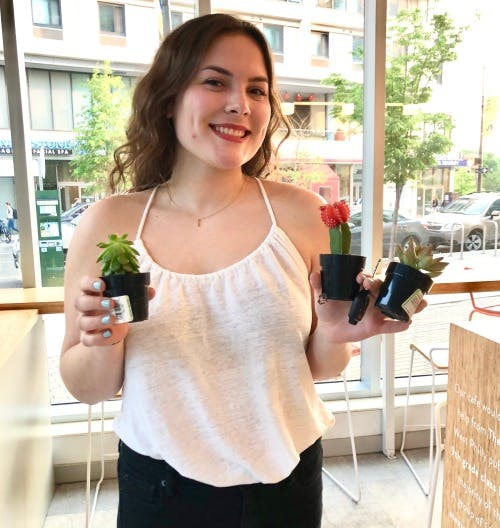Exit Interview: Drexel SCEO Marta Lawler

In the past six months, Marta Lawler has learned a lot. She’s gone from a novice at financials to a profit and loss pro. The 21-year-old learned the difficult task of managing people the same age as her or older. Now, the third-year hospitality major feels much more ready for a career in restaurant or cafe management.
Through the Saxbys Experiential Learning Program, Marta served as the Student Cafe Executive Officer of our Drexel PISB cafe, managing all aspects of the location — from team members to financials — while earning college credit and competitive pay.
On her first day after the six-month program ended, Marta reflected on her Saxbys experience:
How do you feel on your first day away from the cafe?
It feels pretty darn good. I’m proud of myself for doing it, at the same time I’m happy to switch it up and go back to classes.
Tell me a specific lesson you learned.
I had to figure out how to be a leader when working with people the same age or older. I tend to be too nice — and when you’re in charge of people that’s not always the best strategy. I had to figure out how to be nice but also learn how to be strict at times. I had trouble with people not showing up or coming in late. That hurts whole team. So I had to write people up as part of the formal process of disciplining team members. At first I didn’t do it because I thought I could say “don’t do that again” — but you learn that people will do the same things unless you actually have consequences for it.
What did you learn about managing finances?
I’ve never been a math or numbers person so this was really important experience. I’m hoping to have a career in management so knowing the ins-and-outs of business is a must. I learned a lot about cost of goods, how much you’re spending on product, how much you’re wasting and how that affects your profit. It was really cool. I haven’t had business or accounting classes yet, so when I learn about those concepts in class, it’ll make much more sense.
How is the Saxbys experience different than other internships or co-ops?
I’ve had friends tell me about co-ops where they do a few things in the morning, then kind of just sit at a desk the rest of the day. I knew going into this co-op it would be different than other ones and would be challenging — and it definitely was. I was happy to accept the challenge though. I hope the rest of my co-ops are similar, where I can be on my feet interacting with guests all day. A lot of the regulars are so nice and talking to them everyday made the experience more meaningful.
Are there specific things you’ll take with you as your career progresses?
Guest recovery. If you’re going to make it in the restaurant industry, you’ve got to know that things aren’t always going to go right. If you learn how to make it up to a guest, hopefully they’ll come back. There’s guest lifetime value to think about, and developing relationships — even after something goes wrong — is a major benefit. Also, I learned about managing my time. I’ve always been a bit of a procrastinator but you really can’t do that for a job like this. I started to use Google calendars. I set reminders on my iPhone for important things. I also created a system to make sure important emails get answered.
What are your career aspirations?
One idea is to open my own restaurant or cafe. I’m not totally sure though. I’ve always loved food and cooking, so whatever I do, I want to be working with food in some way. I don’t necessarily want to be a chef in a kitchen but maybe involved in menu development at a restaurant.

